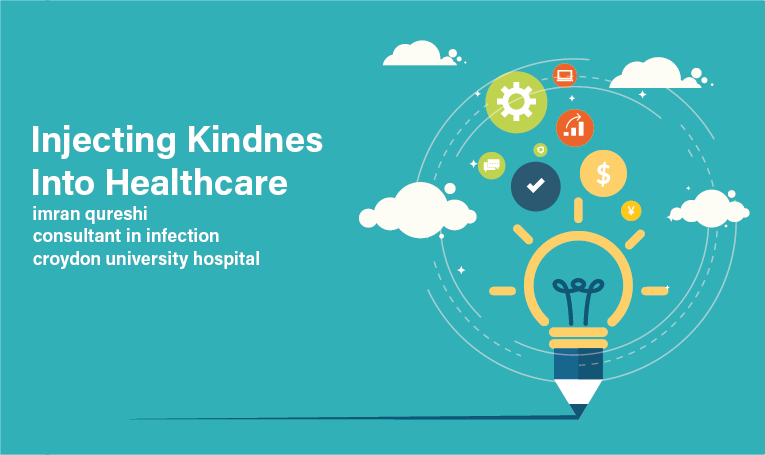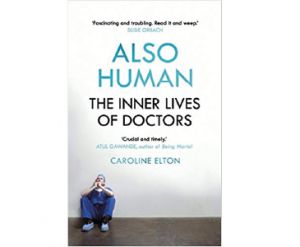Article: Injecting kindness into healthcare

Henry James said, “Three things in human life are important: the first is to be kind; the second is to be kind; and the third is to be kind.” One might think from the title of this piece and from the opening quote, that kindness doesn’t exist in healthcare, the truth is that it does, but not in the way that it should and certainly not in the way that is making the NHS a place where its staff feel invested to work.
The fact is that healthcare is becoming an increasingly difficult environment. The resources available to the NHS have not increased, yet the demands from an ageing population that is living longer with chronic diseases is placing a significant strain on health services. More is expected of staff than ever was before and all whilst maintaining a person-centred focus, how does the patient feel? Have they been included in their treatment and ongoing care? Have we made their experience the best one possible? Do they feel that they have had a holistic experience? These are some of the questions which are being asked of NHS staff on a daily basis. Results of friends and family or inpatient surveys are used to scrutinise the way that we deliver care, and if those results demonstrate any deficiency, then the immediate response is, that ‘we need to do a piece of work to see how we can improve the perception of patients…’ It may sound as if I am being critical of this approach, which actually could not be further from the truth. I am a huge advocate for person-centred care and believe that it is a critical construct in achieving optimal outcomes. However, the ‘but’ that you can detect in my cursive tone, is my constant dismay at the lack of importance given to healthcare-professional-centredness.
You see, for an organisation to be person-centred is politically critical. The negative publicity that can be generated from poor patient/relative feedback can make life very difficult for an NHS organisation, can instigate unannounced inspections from the CQC as well as services being commissioned away from them. No such action is taken when reports of bullying, harassment ore more generic upset come out of healthcare organisations. There is certainly a possibility that it can be (and has been) linked to patient outcomes, such as highlighted by Sir Robert Francis in his report on Mid-Staffordshire Trust, but the sad reality is that the happiness of staff is nearly always viewed as a proxy to patient happiness and not for its own intrinsic value. One of the great triumphs of healthcare is how it has steadily moved to humanising the patient, however the converse is true for its staff. There has been an incremental dehumanisation of the healthcare professional where they are considered a means to an end. Relegated to being service-provision cogs in the great machinery of healthcare organisations, anonymised, devalued and dealt with in the most impersonal way imaginable. What is forgotten, is who and what we are. We are sentient human beings (yes we laugh, cry, hurt, and all the other gamut of emotions that others feel), who are mothers, fathers, husbands, wives, partners, brothers, sisters and children…of someone. We have dreams, hopes, aspirations, fears and concerns just like others do. We suffer from doubt, pain, mistrust, anxiety, depression as well as the complete spectrum of mental health problems just like others do. Why is it then that we are treated like homogenous automatons, whose role is perform particular tasks and any lapse in the performance of that task is met with anger and blame. Terry Pratchett wrote in his novel, I Shall Wear Midnight that, ‘evil begins when you being to treat people as things,’ and that is what we are treated like…things…
So what are we demanding from our healthcare organisations is something so simple, so much within their gift, so fundamental, that its application will change the landscape of healthcare forever. We are demanding kindness. We are believers in the happiness of others from an intrinsic perspective. There needs to be no consequence for anyone else, other than the fact that that individual feels happy. As we mentioned, the happiness of healthcare staff is inevitably linked to the safety of patients, because happier staff are less prone to error and more prone to remaining with an institution, for which an abundance of evidence exists. Our contention with this is, why does patient experience need to be the driver to achieve staff happiness. Why can’t we strive for staff happiness for its own sake?! The reason…because there is no target associated with it, because it offers no financial incentive (in and of itself), and herein lies the problem…here is the cultural pathology within healthcare, that we don’t value our staff as people, that we have no intrinsic need to make them happy. And it is to this disease, this resultant pathology that we need to combat with kindness, and not simply to add it, but to inject it, to administer it as a medicament, to prescribe it on the organisation’s drug chart, to be given as a continuous infusion, and perhaps then and only then will we see the shift that we are holding out for. In The Light In The Heart, Roy Bennett records the quote, ‘Kindness is not a business. True kindness expects nothing in return and should never act with conditions.’ Kindness is indeed not a business, it is not a commodity which can be bartered, that if you (the organisation) agree to be kind, that you expect something in return (from your employee), that is not kindness, that is a mockery of it and a damning indictment on those who treat it as a commodity. Kindness is an antidote to the cultural poisons in healthcare organisations. If you are kind to people, you will make them happy…it really is not more complicated than that.
So this site, this resource that we are creating is designed to help you on that journey, to inject kindness into your organisation. To ensure that every single member of staff, no matter what their role, grade or designation, feels that the organisation intrinsically values them, because of who they are and that there is no expectation attached to it. It will take time, courage and patience, but once you have managed to permeate kindness throughout your organisation, you will see in more ways than you can imagine, the fruit of that labour.
‘Kindness is not added to anything except that it beautifies it and is not removed from anything except that it disfigures it.’ (Prophet Muhammad).


